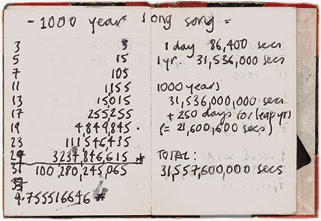Wait For It: Longplayer is Just Getting Started
Longplayer, the epic musical composition / performance / A.I. project initiated by Jem Finer for Artangel, has been playing for less than two percent of its intended duration.
Designed to last a millennium without repetition, Longplayer is barely getting warmed up as it approaches the fourteen year mark of its sonic lifespan. To put that in perspective, the longest Pink Floyd track is just over twenty-six minutes ("Shine On You Crazy Diamond"), and Wagner's Ring cycle clocks in at over sixteen hours. But these epics pale in comparison to Longplayer's thousand year run. If you spent your entire life listening to Longplayer (and who has the time?), you couldn't hope to hear more than ten percent of the evolving composition. One of its main functions is to offer a sensory analog to the expansiveness of time and the difficulty (perhaps futility) that the human lifespan poses to our perception of much beyond "the now." Simultaneously, Longplayer is (or will be) an aggregate of billions of unique moments, in contrast to the serial repetition employed by composers like Steve Reich or Philip Glass. And in an age of music by instant download, Longplayer serves as a heady antidote to the impatient listening encouraged by the iPod Shuffle.
 To the extent that Longplayer is a form of artificial intelligence, it offers a highly-focused, benign example of A.I. that should counter long-standing fears of computers run amok, typified by the HAL9000 of 2001: A Space Odyssey. Unlikely to become a homicidal schizophrenic, the only conceivable "threat" posed by Longplayer is the challenge of its survival across human generations and the inevitable technological, social and political changes to come. This threat / challenge is an integral part of the Longplayer experiment, and one that makes the project elegant, awe-inspiring and, I hope, uniquely sustainable.
To the extent that Longplayer is a form of artificial intelligence, it offers a highly-focused, benign example of A.I. that should counter long-standing fears of computers run amok, typified by the HAL9000 of 2001: A Space Odyssey. Unlikely to become a homicidal schizophrenic, the only conceivable "threat" posed by Longplayer is the challenge of its survival across human generations and the inevitable technological, social and political changes to come. This threat / challenge is an integral part of the Longplayer experiment, and one that makes the project elegant, awe-inspiring and, I hope, uniquely sustainable.
 |
| A page from the Longplayer notebook, 1995 |
 To the extent that Longplayer is a form of artificial intelligence, it offers a highly-focused, benign example of A.I. that should counter long-standing fears of computers run amok, typified by the HAL9000 of 2001: A Space Odyssey. Unlikely to become a homicidal schizophrenic, the only conceivable "threat" posed by Longplayer is the challenge of its survival across human generations and the inevitable technological, social and political changes to come. This threat / challenge is an integral part of the Longplayer experiment, and one that makes the project elegant, awe-inspiring and, I hope, uniquely sustainable.
To the extent that Longplayer is a form of artificial intelligence, it offers a highly-focused, benign example of A.I. that should counter long-standing fears of computers run amok, typified by the HAL9000 of 2001: A Space Odyssey. Unlikely to become a homicidal schizophrenic, the only conceivable "threat" posed by Longplayer is the challenge of its survival across human generations and the inevitable technological, social and political changes to come. This threat / challenge is an integral part of the Longplayer experiment, and one that makes the project elegant, awe-inspiring and, I hope, uniquely sustainable. 

Comments
Post a Comment